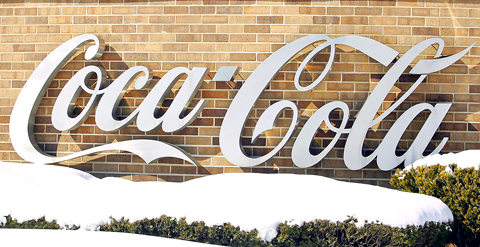Coca-Cola Co unveiled plans on Thursday to take over the North American operations of its largest bottler, gaining control of production and distribution in a market shifting away from carbonated drinks.
The soft drink giant said it would acquire the North American operations of its largest bottler, Coca-Cola Enterprises (CCE).
The largely cashless deal also called for Coca-Cola to sell its bottling operations in Norway and Sweden to CCE. At the close of the agreement, Coca-Cola Co would have direct control over approximately 90 percent of total North American volume.

PHOTO: BLOOMBERG
A company spokesman said the total value of the transaction was between US$12.5 billion and US$13 billion, depending on various factors.
The acquisition uses Coca-Cola shares and its current 34 percent stake in CCE, in a swap of assets. The soft drink group also agreed to assume US$8.88 billion of CCE debt.
Concurrently, the deal would see CCE buy Coca-Cola’s bottling operations in Sweden and Norway for US$822 million, subject to the signing of definitive agreements.
The bottler would have the right to acquire Coca-Cola’s 83 percent stake in its German bottling operations at a later date.
“This is a truly historic day for the Coca-Cola system,” Coca-Cola chairman and chief executive Muhtar Kent said in a statement. “Importantly, the creation of a unified operating system will strategically position us to better market and distribute North America’s most preferred nonalcoholic beverage brands.”
The move followed rival PepsiCo’s announcement last year to acquire two of its key bottlers for a more fully integrated distribution system.
PepsiCo chief executive Indra Nooyi said at the time that “the fully integrated beverage business will enable us to bring innovative products and packages to market faster, streamline our manufacturing and distribution systems and react more quickly to changes in the marketplace.”
Tom Taulli, an independent analyst and financial adviser, said both Coke and Pepsi are moving away from the strategy of using independent franchised bottlers in order to have more control in a changing market.
The franchise strategy “now looks outmoded, especially in mature markets like the US,” Taulli said. “The main reason is the continued sluggishness in carbonated beverage sales. Consumers are moving towards alternatives such as juice drinks, vitamin waters, teas and other niche offerings. By controlling Coca Cola Enterprises, Coke will now have the ability to quickly add new product offerings.”
Analyst Mark Greenberg at Deutsche Bank said the move by Coke is “validating Pepsi’s view that a franchise system was unworkable domestically.”
The move comes amid dramatic changes in the soft-drink business, with US consumers shifting to bottled water, juices, sports drinks and energy drinks.
Coke reported that last year total beverage case volumes rose 3.0 percent, but most of that was in the non-carbonated segment, such as its Dasani water and Fruitopia and Minute Maid juices.
Speaking to CNBC television, Kent said that “consumers are changing rapidly everywhere around the world, not just here in the US. Consumers are changing in China. Consumers are changing in Russia. Consumers are changing in Western Europe and Latin America.”

Right-wing political scientist Laura Fernandez on Sunday won Costa Rica’s presidential election by a landslide, after promising to crack down on rising violence linked to the cocaine trade. Fernandez’s nearest rival, economist Alvaro Ramos, conceded defeat as results showed the ruling party far exceeding the threshold of 40 percent needed to avoid a runoff. With 94 percent of polling stations counted, the political heir of outgoing Costa Rican President Rodrigo Chaves had captured 48.3 percent of the vote compared with Ramos’ 33.4 percent, the Supreme Electoral Tribunal said. As soon as the first results were announced, members of Fernandez’s Sovereign People’s Party

EMERGING FIELDS: The Chinese president said that the two countries would explore cooperation in green technology, the digital economy and artificial intelligence Chinese President Xi Jinping (習近平) yesterday called for an “equal and orderly multipolar world” in the face of “unilateral bullying,” in an apparent jab at the US. Xi was speaking during talks in Beijing with Uruguayan President Yamandu Orsi, the first South American leader to visit China since US special forces captured then-Venezuelan president Nicolas Maduro last month — an operation that Beijing condemned as a violation of sovereignty. Orsi follows a slew of leaders to have visited China seeking to boost ties with the world’s second-largest economy to hedge against US President Donald Trump’s increasingly unpredictable administration. “The international situation is fraught

MORE RESPONSIBILITY: Draftees would be expected to fight alongside professional soldiers, likely requiring the transformation of some training brigades into combat units The armed forces are to start incorporating new conscripts into combined arms brigades this year to enhance combat readiness, the Executive Yuan’s latest policy report said. The new policy would affect Taiwanese men entering the military for their compulsory service, which was extended to one year under reforms by then-president Tsai Ing-wen (蔡英文) in 2022. The conscripts would be trained to operate machine guns, uncrewed aerial vehicles, anti-tank guided missile launchers and Stinger air defense systems, the report said, adding that the basic training would be lengthened to eight weeks. After basic training, conscripts would be sorted into infantry battalions that would take

GROWING AMBITIONS: The scale and tempo of the operations show that the Strait has become the core theater for China to expand its security interests, the report said Chinese military aircraft incursions around Taiwan have surged nearly 15-fold over the past five years, according to a report released yesterday by the Democratic Progressive Party’s (DPP) Department of China Affairs. Sorties in the Taiwan Strait were previously irregular, totaling 380 in 2020, but have since evolved into routine operations, the report showed. “This demonstrates that the Taiwan Strait has become both the starting point and testing ground for Beijing’s expansionist ambitions,” it said. Driven by military expansionism, China is systematically pursuing actions aimed at altering the regional “status quo,” the department said, adding that Taiwan represents the most critical link in China’s